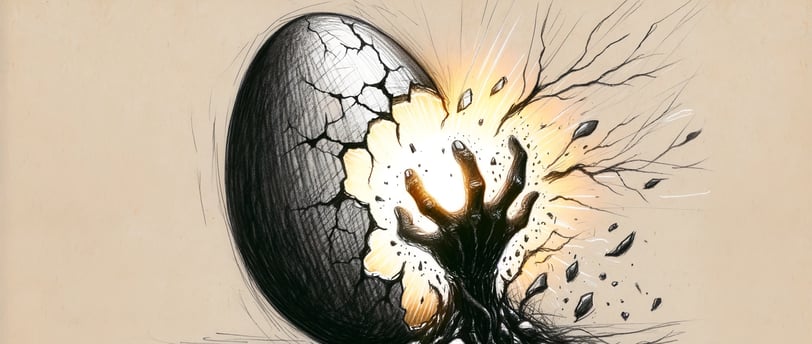How Inner Forces Drive Personal, Professional, and Societal Transformation
“If an egg is broken by an outside force, life ends. If broken by an inside force, life begins. Great things always begin from the inside."
Josh Ether
6/2/20243 min read


Quote by Jim Kwik:
“If an egg is broken by an outside force, life ends.
If broken by an inside force, life begins.
Great things always begin from the inside."
Expanding on Jim Kwik's metaphor of the egg, which suggests that true change and beginnings come from within, we can delve deeper into various dimensions of life and work where this idea has profound implications. This metaphor isn't just a poetic reflection; it offers a robust framework for understanding how genuine transformation and innovation are sparked and sustained.
Personal Growth and Resilience
On a personal level, embracing the concept of internal force means recognizing that our deepest growth often occurs during periods of self-reflection and internal challenge. When we decide to break through our limitations from the inside, we're not just reacting to external circumstances; we are proactively shaping our destiny. This internal breaking can be seen in moments of personal crisis or decision—choosing to leave an unfulfilling job, ending a toxic relationship, or starting a new path in life that aligns more closely with one’s personal values.
These decisions, while often difficult, are the points where new life and possibilities begin. They require a deep sense of self-awareness and the courage to act in accordance with one's inner convictions rather than external expectations. This self-directed change fosters resilience, as individuals learn not only to survive but thrive by adapting and transforming their inner selves to meet external challenges.
Professional Innovation and Leadership
In the professional sphere, internal motivation is the bedrock of true innovation and effective leadership. Great leaders and innovators don't merely respond to market trends or competitive pressures; they create visions based on what they believe is possible and necessary. Steve Jobs, for instance, wasn’t driven by market needs but by his vision of what personal computing could become. His internal vision and relentless drive revolutionized multiple industries, from computers and animated movies to music and mobile phones.
This kind of transformational leadership requires a deep connection to one’s own internal compass and a willingness to challenge the status quo from within. It is about more than just having innovative ideas; it is about having the conviction to see them through against external doubts and obstacles. Leadership that begins internally often results in a culture that values creativity, autonomy, and alignment around shared values and visions, fostering environments where others are also encouraged to initiate change from within.
Societal Change and Community Impact
On a societal level, significant movements and reforms often start with individuals or small groups who are driven by a powerful internal commitment to justice, equality, or change. Historical figures like Mahatma Gandhi or Rosa Parks were driven by deep internal convictions that led them to take actions that sparked massive social and political changes. Their internal breaks—decisions to defy unjust laws and societal norms—initiated movements that transformed societies.
In communities today, change makers are those who feel a compelling internal urge to address issues like poverty, education, and health care. Their internal drive leads to new initiatives, non-profits, and community programs that might not have external impetus but are essential for societal well-being. The success of such initiatives often hinges on the leader's ability to maintain their internal vision and inspire others to join their cause, illustrating how internal force is not just a personal phenomenon but a communal catalyst.
Daily Life and Interpersonal Relationships
In everyday life and in our interactions with others, the concept of internal force reminds us that our responses to people and situations can also start from within. This might involve choosing empathy over judgment, kindness over anger, or understanding over indifference. These choices, when driven by an internal decision to act according to our values rather than external pressures to conform or react, can transform our relationships and social interactions.
Jim Kwik’s metaphor of the egg, therefore, serves as a powerful reminder across all areas of life. Whether in personal growth, professional development, societal impact, or daily interactions, the principle that "great things always begin from the inside" encourages us to cultivate our inner strength, wisdom, and motivation. By focusing on developing our internal capacities and listening to our inner voices, we empower ourselves to initiate meaningful changes that can lead to profound outcomes in our lives and in the world around us.
